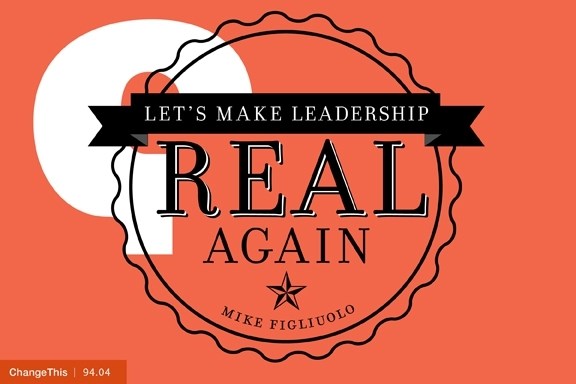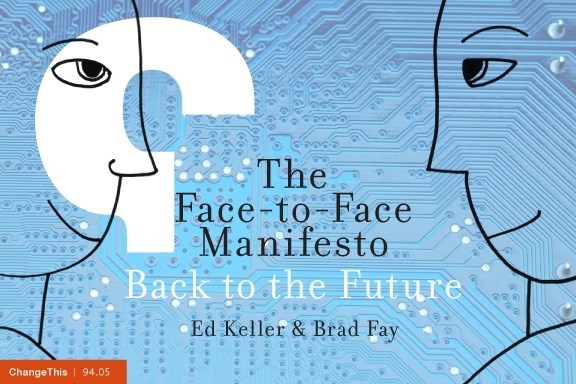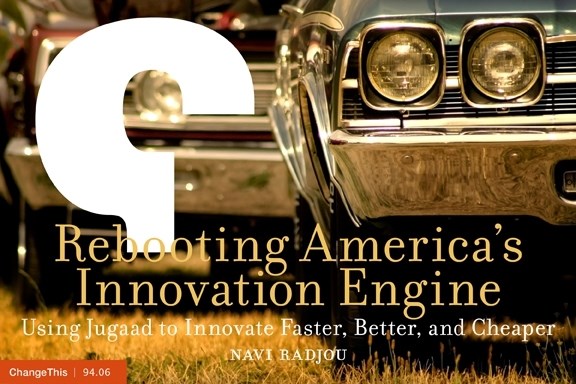ChangeThis RSS
"The Shattering is the moment where everything familiar slips away. Our protective facades of familiarity spontaneously combust and we shun faith, deny comfort. We're left voiceless regardless of our need to scream. We tread water in an ocean filled with every brilliant memory of what was only moments ago. Life has a cruel way of serving up The Shatterings, too. Nary a Google or Outlook Calendar would deign to accept the meeting and we're left simply wondering
What. The Fuck. Happened?
Over the past seventeen months, I've become a student of that question. In the process, I've gone through even more Shatterings. And I've come to one invaluable realization:
I've been asking the wrong question.
I shouldn't concern myself with what happened. I should be asking, 'What's happening?'"
Continue reading
"What has happened to leadership? With all the crises and challenges we face and the increasingly risk-averse environment in which we operate, leadership has become generic, ephemeral, and bland.
We have devolved from leaders into managers. Admiral Grace Murray Hopper said it best—you manage things, but you lead people. The problem is we're no longer leading. We're hiding behind committees. We're using the crutches of data and metrics to make our decisions for us. We blame policies and corporate culture for the problems our teams face rather than delivering the tough messages with a sense of ownership.
The result of all of this is our people don't trust us anymore. Work has become transactional. They do the work and we pay them. It's a fee-for-service mindset. When they find someone who will pay them more for their services, they're gone. And when we no longer have need of their services, we simply cast those people aside. It's a toxic environment. It's hard for people to trust their leaders when they feel like they're simply a cog in the machine."
Continue reading
"It is undeniable that Facebook, the king of the social media hill, has accumulated a huge number of users who spend growing amounts of time on the site. Its growth and ability to attract a loyal and highly networked audience is to be admired. For brands, however, it is far from the Holy Grail of marketing. Facebook and other online social networks represent merely one channel out of many that marketers can tap to spark a powerful word of mouth wave. And when looked at in the context of the 'total social' opportunity, it is but one very small part of the overall picture and needs to be seen as such. And true to Naisbitt's 'high tech, high touch' megatrend, the fact is that online social networking is no substitute for the power and impact of face-to-face communications. Real world conversations—most of which take place face-to-face—are still the dominant mode of communication, and they are the most trusted and persuasive."
Continue reading
"The motto 'innovate or die' held true for American firms in the 20th century. In the 21st century, 'innovate faster, better, and cheaper—or die' will be your new mantra. Indeed, in today's hypercompetitive, ber-connected, and globally integrated economy, you need to crank out new products faster than you can spell 'R&D,' or else your customers will switch their allegiance to more agile rivals. Plus, your products need to deliver more value to customers—value no longer being defined by the bells and whistles in your product, but by the experience customers get from using your product. Finally, given the rapidly-shrinking purchasing power of the American middle class, your products got to be affordable to meet the frugal needs of thrifty US buyers. In sum, you need to innovate faster, better, and cheaper. Sadly, Corporate America is just not equipped to do that."
Continue reading
"Alan Mulally arrived in Dearborn like a Kansas cyclone, ripping through Ford's dark-paneled corridors like a twister through a trailer park. He would take a sledgehammer to the automaker's ossified silos, force long-time adversaries to kiss and make-up and challenge Ford's most cherished delusions. Over the next three years, he would also make Ford the most profitable automaker in the world. Mulally would do it as the rest of the American automobile industry fell apart in the face of the worst economic crisis since the Great Depression. And he would do it without taking a government bailout."
Continue reading









